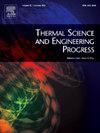Optimization of biodiesel extraction from mixing of Jatropha curcas, Ricinus communis, Mimusops elengi, Prosopis juliflora and Delonix regia oil − A systematic economic approach with novel metal complex catalyst
IF 5.4
3区 工程技术
Q2 ENERGY & FUELS
引用次数: 0
Abstract
The rising global energy demand and environmental concerns over fossil fuel consumption have intensified the search for sustainable and renewable alternatives. Biodiesel has emerged as a promising substitute due to its biodegradability, lower emissions, and renewable origin. In this experimental study, biodiesel was extracted from a mixed oil blend comprising Jatropha curcas, Ricinus communis, Mimusops elengi, Prosopis juliflora, and Delonix regia seeds. These nonedible plant sources were specifically selected due to their abundance, underutilization, and high oil content, making them suitable candidates for sustainable biodiesel production. A novel metal complex catalyst was employed in the transesterification process to enhance yield efficiency and cost-effectiveness through a systematic economic approach at room temperature with proper spectroscopic characterization. A biodiesel yield of approximately 95 % was achieved through a computational optimization approach by modeling the reaction kinetics, with the optimized parameters being catalyst concentration of 9 wt%, methanol to oil ratio of 0.25 v/v, stirring speed of 120 rpm, and a reaction time of 120 min. Gas chromatography-Mass Spectrometry (GC–MS) analysis was facilitated to confirm the biodiesel quality through the balanced quantity of saturated and unsaturated fatty acids. Moreover, the physicochemical properties of the produced biodiesel were thoroughly evaluated to ensure compliance with the required quality parameters specified by international fuel standards, including the American Society for Testing and Materials (ASTM) and the European Committee for Standardization (EN), thereby validating its suitability as a sustainable alternative for transportation fuels.
麻疯树、蓖麻、石竹、黄豆和龙参油混合提取生物柴油的优化——新型金属络合催化剂的系统经济方法
日益增长的全球能源需求和对化石燃料消耗的环境担忧,促使人们加紧寻找可持续和可再生的替代品。生物柴油因其生物可降解性、低排放和可再生来源而成为一种有前途的替代品。在这项实验研究中,生物柴油是从一种混合油中提取出来的,这种混合油包括麻疯树、蓖麻、米苏索普、朱莉叶Prosopis juliflora和德龙ix regia种子。这些不可食用的植物来源被特别选择,因为它们丰富,未充分利用,含油量高,使它们成为可持续生物柴油生产的合适人选。采用一种新型金属配合物催化剂在室温条件下进行酯交换反应,通过系统的经济方法和适当的光谱表征,提高了收率和成本效益。通过模拟反应动力学,以催化剂质量分数为9 wt%、甲醇油比为0.25 v/v、搅拌转速为120 rpm、反应时间为120 min为优化参数,对生物柴油的产率进行了优化计算,得到了约95%的生物柴油产率。气相色谱-质谱(GC-MS)分析通过饱和和不饱和脂肪酸的平衡量来确定生物柴油的质量。此外,所生产的生物柴油的物理化学特性进行了全面评估,以确保符合国际燃料标准规定的要求质量参数,包括美国材料试验协会(ASTM)和欧洲标准化委员会(EN),从而验证了其作为可持续替代运输燃料的适用性。
本文章由计算机程序翻译,如有差异,请以英文原文为准。
求助全文
约1分钟内获得全文
求助全文
来源期刊

Thermal Science and Engineering Progress
Chemical Engineering-Fluid Flow and Transfer Processes
CiteScore
7.20
自引率
10.40%
发文量
327
审稿时长
41 days
期刊介绍:
Thermal Science and Engineering Progress (TSEP) publishes original, high-quality research articles that span activities ranging from fundamental scientific research and discussion of the more controversial thermodynamic theories, to developments in thermal engineering that are in many instances examples of the way scientists and engineers are addressing the challenges facing a growing population – smart cities and global warming – maximising thermodynamic efficiencies and minimising all heat losses. It is intended that these will be of current relevance and interest to industry, academia and other practitioners. It is evident that many specialised journals in thermal and, to some extent, in fluid disciplines tend to focus on topics that can be classified as fundamental in nature, or are ‘applied’ and near-market. Thermal Science and Engineering Progress will bridge the gap between these two areas, allowing authors to make an easy choice, should they or a journal editor feel that their papers are ‘out of scope’ when considering other journals. The range of topics covered by Thermal Science and Engineering Progress addresses the rapid rate of development being made in thermal transfer processes as they affect traditional fields, and important growth in the topical research areas of aerospace, thermal biological and medical systems, electronics and nano-technologies, renewable energy systems, food production (including agriculture), and the need to minimise man-made thermal impacts on climate change. Review articles on appropriate topics for TSEP are encouraged, although until TSEP is fully established, these will be limited in number. Before submitting such articles, please contact one of the Editors, or a member of the Editorial Advisory Board with an outline of your proposal and your expertise in the area of your review.
 求助内容:
求助内容: 应助结果提醒方式:
应助结果提醒方式:


